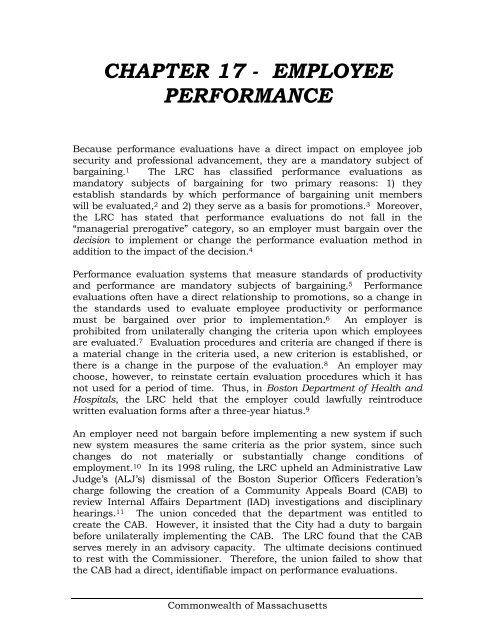Management Rights - AELE's Home Page
Management Rights - AELE's Home Page
Management Rights - AELE's Home Page
Create successful ePaper yourself
Turn your PDF publications into a flip-book with our unique Google optimized e-Paper software.
CHAPTER 17 - EMPLOYEE<br />
PERFORMANCE<br />
Because performance evaluations have a direct impact on employee job<br />
security and professional advancement, they are a mandatory subject of<br />
bargaining. 1 The LRC has classified performance evaluations as<br />
mandatory subjects of bargaining for two primary reasons: 1) they<br />
establish standards by which performance of bargaining unit members<br />
will be evaluated, 2 and 2) they serve as a basis for promotions. 3 Moreover,<br />
the LRC has stated that performance evaluations do not fall in the<br />
“managerial prerogative” category, so an employer must bargain over the<br />
decision to implement or change the performance evaluation method in<br />
addition to the impact of the decision. 4<br />
Performance evaluation systems that measure standards of productivity<br />
and performance are mandatory subjects of bargaining. 5 Performance<br />
evaluations often have a direct relationship to promotions, so a change in<br />
the standards used to evaluate employee productivity or performance<br />
must be bargained over prior to implementation. 6 An employer is<br />
prohibited from unilaterally changing the criteria upon which employees<br />
are evaluated. 7 Evaluation procedures and criteria are changed if there is<br />
a material change in the criteria used, a new criterion is established, or<br />
there is a change in the purpose of the evaluation. 8 An employer may<br />
choose, however, to reinstate certain evaluation procedures which it has<br />
not used for a period of time. Thus, in Boston Department of Health and<br />
Hospitals, the LRC held that the employer could lawfully reintroduce<br />
written evaluation forms after a three-year hiatus. 9<br />
An employer need not bargain before implementing a new system if such<br />
new system measures the same criteria as the prior system, since such<br />
changes do not materially or substantially change conditions of<br />
employment. 10 In its 1998 ruling, the LRC upheld an Administrative Law<br />
Judge’s (ALJ’s) dismissal of the Boston Superior Oficers Federation’s<br />
charge following the creation of a Community Appeals Board (CAB) to<br />
review Internal Affairs Department (IAD) investigations and disciplinary<br />
hearings. 11 The union conceded that the department was entitled to<br />
create the CAB. However, it insisted that the City had a duty to bargain<br />
before unilaterally implementing the CAB. The LRC found that the CAB<br />
serves merely in an advisory capacity. The ultimate decisions continued<br />
to rest with the Commissioner. Therefore, the union failed to show that<br />
the CAB had a direct, identifiable impact on performance evaluations.<br />
Commonwealth of Massachusetts
















